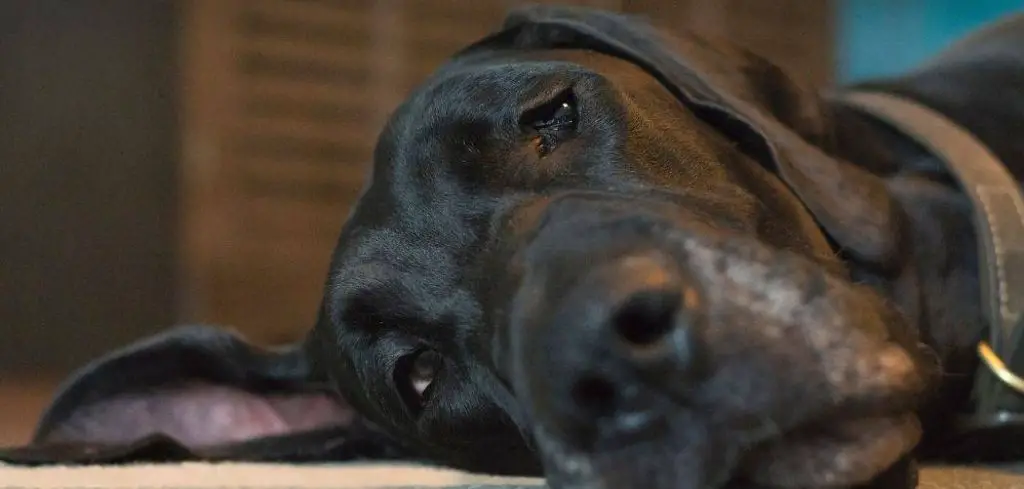When your dog develops diarrhea after starting an antibiotic, it can be alarming and messy to manage.
While antibiotics are essential for treating bacterial infections, they can also lead to loose stools and discomfort.
We outline the common causes of diarrhea in dogs after antibiotic use, what you can do at home, and when to seek veterinary help.
Dog Panting and Abdominal Pain — Understanding the Link
Dog diarrhea due to antibiotics happens because antibiotics can upset your dog’s digestive system by altering the healthy bacteria in the gut. This disruption, known as dysbiosis, can lead to diarrhea, gas, and loss of appetite.
In some cases, antibiotics may trigger an allergic reaction, cause irritation to the intestinal lining, or worsen an existing digestive issue.
Other factors such as the dog’s age, underlying health conditions, and diet during treatment can also influence how severely they react.

Common Causes of Diarrhea in Dogs Due to Antibiotics
Gut Microbiome Imbalance
Antibiotics work by killing bacteria—but they aren’t selective. They eliminate both harmful and beneficial bacteria.
The loss of these helpful microbes can reduce digestive efficiency and allow harmful bacteria to multiply, resulting in diarrhea.
You might notice soft or watery stools, sometimes accompanied by foul odor.
Read more: Dog Diarrhea Due To Medication (Why it happens)
Antibiotic-Associated Colitis
In some dogs, antibiotics can trigger inflammation in the colon, a condition known as antibiotic-associated colitis.
This can cause frequent diarrhea, straining, and even small amounts of blood or mucus in the stool.
It tends to develop within days of starting medication and can worsen if not addressed.
Food Sensitivities During Treatment
When a dog is unwell, owners often change their diet or offer new treats to encourage eating.
However, introducing new foods while the gut is already stressed from antibiotics can increase the risk of diarrhea.
The combination of antibiotic effects and dietary changes can be especially harsh on sensitive stomachs.
Overgrowth of Harmful Bacteria (C. difficile)
Occasionally, antibiotics create an environment where harmful bacteria such as Clostridium difficile can overgrow.
This can cause severe, watery diarrhea and may require additional treatment. Dogs with weakened immune systems or previous digestive problems are more vulnerable to this complication.
Underlying Illness
Sometimes, diarrhea is not solely due to the antibiotics but the infection or illness being treated.
For example, a dog on antibiotics for a gastrointestinal infection might still have diarrhea as the primary disease resolves.
In these cases, the antibiotics are addressing the cause, but symptoms persist until healing is complete.
What to Do If Your Dog Has Diarrhea Due to Antibiotics
If your dog develops diarrhea during antibiotic treatment, ensure they have constant access to fresh water to prevent dehydration.
You can ask your vet whether it’s safe to add a probiotic to help restore healthy gut bacteria.
Feeding a bland diet, such as boiled chicken and rice, for a few days can be gentler on their stomach.
Avoid giving treats, table scraps, or sudden food changes.
Always check with your vet before stopping the antibiotics, as abruptly discontinuing them can make the infection return or worsen.
When to Call or Visit Your Vet
Contact your vet promptly if your dog’s diarrhea is severe, watery, or contains blood. Persistent vomiting, lethargy, refusal to drink, or signs of abdominal pain are also red flags.
Puppies, elderly dogs, and those with chronic illnesses are more at risk for complications from dehydration and may require prompt supportive care.
Even if symptoms seem mild, let your vet know about any changes during antibiotic treatment so they can adjust the medication or recommend supportive therapies.
Read more: Dog Diarrhea Due to Food Change (Why it happens and how to help)
Key Takeaway
Diarrhea due to antibiotics in dogs is often linked to gut bacteria imbalance, digestive irritation, or secondary effects from the illness being treated.
While mild cases can improve with supportive care and probiotics, persistent or severe diarrhea needs veterinary attention.
Always monitor your dog closely during antibiotic treatment and communicate with your vet about any concerns to keep their recovery on track.
